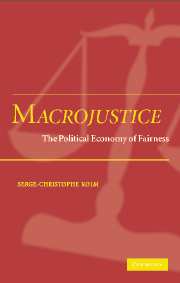Book contents
- Frontmatter
- Contents
- Presentation
- PART ONE BASES: CONSENSUS, FREEDOMS, AND CAPACITIES
- 1 Macrojustice: An overview of its place, method, structure, and result
- 2 Social freedom
- 3 The liberal theory
- 4 Free and equal in rights
- 5 Resources
- 6 Capacities
- PART TWO OVERALL DISTRIBUTIVE JUSTICE: ELIE (EQUAL LABOUR INCOME EQUALIZATION)
- PART THREE COMPARISONS WITH POLICIES AND PHILOSOPHIES
- PART FOUR THE DEGREE OF COMMUNITY, EQUALITY, RECIPROCITY, AND SOLIDARITY
- PART FIVE COMPARISON WITH ECONOMICS' SOCIAL ETHICS
- References and bibliography
- Index
3 - The liberal theory
Published online by Cambridge University Press: 31 July 2009
- Frontmatter
- Contents
- Presentation
- PART ONE BASES: CONSENSUS, FREEDOMS, AND CAPACITIES
- 1 Macrojustice: An overview of its place, method, structure, and result
- 2 Social freedom
- 3 The liberal theory
- 4 Free and equal in rights
- 5 Resources
- 6 Capacities
- PART TWO OVERALL DISTRIBUTIVE JUSTICE: ELIE (EQUAL LABOUR INCOME EQUALIZATION)
- PART THREE COMPARISONS WITH POLICIES AND PHILOSOPHIES
- PART FOUR THE DEGREE OF COMMUNITY, EQUALITY, RECIPROCITY, AND SOLIDARITY
- PART FIVE COMPARISON WITH ECONOMICS' SOCIAL ETHICS
- References and bibliography
- Index
Summary
PROCESS LIBERALISM
“This is mine because I made it or bought it with well-earned money”: This view expresses the common sentiment about distributive justice that underlies and founds the moral theory of process liberalism. There, legitimate ownership results from action, basically from free action. The “well-earned” qualificative indicates the time-regressive structure of the theory. Note, however, that people have neither made nor bought their own given capacities with which they produce or earn.
Process liberalism is a moral theory in social ethics, which is the moral valuation or hypostasis (or moral secular enshrinement) of process-freedom; that is, it consists of holding that individuals should be free to act and benefit from the consequences of their acts without forceful interference. Process liberalism has an important place in almost all societies because it defends a basic freedom and right. Moreover, process liberalism is the basic and central social-ethical theory of the modern world, a place and role it has been holding for the last couple of centuries. It is demanded by the classical “basic rights”, notably under the form of the respect of property. The full process-freedom it wants amounts to social freedom, although in focussing on some aspects and some applications, notably in the field of the economy. It will shortly be reminded that a consequence of process-freedom is the legitimacy of property rights acquired according to its rule, and of the corresponding free exchanges and free markets.
- Type
- Chapter
- Information
- MacrojusticeThe Political Economy of Fairness, pp. 53 - 69Publisher: Cambridge University PressPrint publication year: 2004



